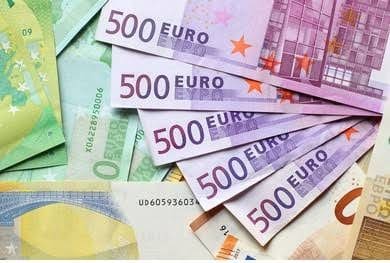Currency exchange rates are important in all aspects of finance and trading because they give a clear and concise explanation of the value of both currencies, especially in the foreign exchange market.
Currency exchange rates are quite volatile for so many reasons such as inflation, price level, net import and export etc.
In essence, the exchange rate between these two currencies is determined by the economic activities of both countries. For example, If Nigeria exports more or the same goods and services as it imports from Spain, then the Nigerian Naira will have a favourable exchange rate with the Spanish currency.
This article seeks to address the factors affecting exchange rates and how to calculate the currency exchange rates of Spanish currency to Naira, so let’s quickly talk about how much the 1000 Spanish Currency to Naira exchange rate is.

Understanding the Spanish Currency (Euro)
Spain is a country in Europe and also a member of the European Union. The official currency of Spain is the Euro and the official currency of Nigeria is the Naira.
However, the Euro is a strong currency in Europe and has also been adopted by twenty member countries (including Spain) out of the twenty-seven members of the European Union.
The Euro was formally introduced to the European Union as a non-monetary unit in 1999 but the currencies started circulating in participating countries in 2002. This also necessitated the participating countries to abolish their former currencies and adopt Euro as their legal tender.
The first twelve countries of the European Union were UK, France, Germany, Italy, Belgium, Ireland, Denmark, Netherlands, Portugal, Greece, Luxemburg and Spain. The motive of the European Union was to form a strong and indestructible economic, political and social structure among member European countries.
One of the best ways to wield this economic power in the world was to introduce a common currency and enact flexible economic policies among member nations such as eliminating trade barriers and reforming tariffs and trade policies.
The current exchange rate of the Euro to other currencies depends on a lot of factors, hence, the exchange rate is quite volatile and not fixed.
Some of these factors include price and inflation, monetary policy, GDP, and balance of payment.
Understanding the Nigerian Naira
The Naira is the official currency of Nigeria, a country in West Africa. It was introduced in 1973, thirteen years after the county’s independence in 1960. Before this time, the official currency in Nigeria was the pound sterling and Naira was pegged at N2 for 1 pound after it was introduced.
The Central bank of Nigeria was established in 1958 but it began issuing and managing the Naira in 1973.
The N20 was introduced on 11th February 1977 while on 2nd July 1979, the CBN introduced three denominations of the ₦1, ₦5 and ₦10 of new currency banknotes.
To promote a productive payments system and improve economic activities, the ₦100, ₦200, ₦500 and ₦1000 notes were introduced in December 1999, November 2000, April 2001 and October 2005 respectively.
The CBN operates both the fixed and floating exchange rate regime in Nigeria, so the exchange rate of Naira to other currencies is quite volatile and depends on some factors such as monetary policies, sentiments, political factors, net import and export, price level and inflation, a global crisis such as a pandemic.
Exchange Rate Calculation
An exchange rate is the relative price of one currency expressed in terms of another currency (or a group of currencies). We have seen some factors that may affect exchange rates between two currencies which makes it quite volatile. But how is the exchange rate determined?
For trade to occur between two countries, one currency must be exchanged for the other right? Even if you want to trade one currency for another, you have to pay a certain amount of your currency(£) to get that($).
For example, if Euro is used to buy dollars, we will have a currency pair of EUR/USD.
If the pair for EUR/USD is 1.45 on the forex market, it simply means you’ll need $1.45 to purchase one unit of Euro.
If you want to know how much you’ll need to purchase one unit of USD, then use the formulae; 1/exchange rate(1.45) which is 1/1.45 = 0.689.
You can view all currency pairs of the forex market on major forex brokers.
The current exchange rate of £1000 (euros) to naira is 492,327.75 at the exchange rate of 492.328.
If you want to know how much 1Naira is to 1 Euro, simply say 1/492.328 and you have 0.00203117 Euro.
Some of the major and popular currency conversion tools are xe.com, oanda.com, transferwise.com, bankrate.com, travelex.com
Factors Affecting Currency Exchange Rates
As we mentioned earlier, some factors currency exchange rates enormously and they can be grouped into political factors, monetary and economic factors, and global and regional factors.
If there is political unrest in a country, it will likely affect its exchange rates against other currencies because such a crisis invariably slows down economic activities, low productivity and exports, low foreign direct investment and hence, low-performing currency in the forex market.
Monetary and economic factors are captured in inflation, interest rates, recession and balance of payments. A high inflation rate is a testament to a depreciation in the value of a currency while a low inflation rate suggests that such currency is appreciating.
Higher interest rates in a country’s currency attract more lenders by bringing in foreign capital which causes an increase in the value of a currency.
Balance of payment is the net balance of a nation’s imports and export. A nation that exports more than imports will have a more valuable currency in the forex market than a nation that exports more.
Global and regional factors such as pandemics, natural disasters and wars can also affect the currency exchange rate of nations negatively.
A critical view of the factors affecting currency exchange rates will already tell you what you need to know about the wide exchange rate gap between Spain and Nigeria.
Spain is an industrialized country, exporting most of its goods and services, unlike Nigeria which is a consumer nation. Spain is a member of the European Union, protected and backed by strong political and economic policies, unlike Nigeria.
Conclusion
The Naira to Euro exchange rate is not a fixed rate, even though we have about 492 today. It may be more tomorrow or even less.
Whatever it is, the knowledge you have obtained from the article will make you understand the reasons it fluctuates.
Remember to always check the current exchange rate between any currency pairs on platforms like xe.com, bankrate.com, oanda.com etc.

